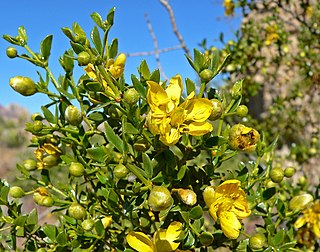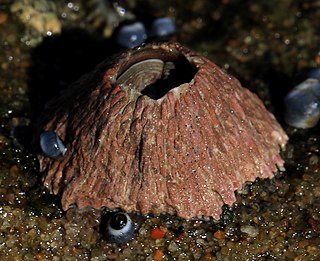
Genus is a taxonomic rank above species and below family as used in the biological classification of living and fossil organisms as well as viruses. In binomial nomenclature, the genus name forms the first part of the binomial species name for each species within the genus.

Pseudoscorpions, also known as false scorpions or book scorpions, are small, scorpion-like arachnids belonging to the order Pseudoscorpiones, also known as Pseudoscorpionida or Chelonethida.

Zygophyllaceae is a family of flowering plants that contains the bean-caper and caltrop. The family includes around 285 species in 22 genera.

Sawflies are wasp-like insects that are in the suborder Symphyta within the order Hymenoptera, alongside ants, bees, and wasps. The common name comes from the saw-like appearance of the ovipositor, which the females use to cut into the plants where they lay their eggs. The name is associated especially with the Tenthredinoidea, by far the largest superfamily in the suborder, with about 7,000 known species; in the entire suborder, there are 8,000 described species in more than 800 genera. Symphyta is paraphyletic, consisting of several basal groups within the order Hymenoptera, each one rooted inside the previous group, ending with the Apocrita which are not sawflies.

Noteridae is a family of adephagan water beetles closely related to the Dytiscidae, and formerly classified with them. They are mainly distinguished by the presence of a distinctive "noterid platform" underneath, in the form of a plate between the second and third pair of legs. The family consists of about 230 species in 14 genera, and is found worldwide, more commonly in the tropics. They are sometimes referred to as burrowing water beetles.

A true toad is any member of the family Bufonidae, in the order Anura. This is the only family of anurans in which all members are known as toads, although some may be called frogs. The bufonids now comprise more than 35 genera, Bufo being the best known.

Tenthredinidae is the largest family of sawflies, with well over 7,500 species worldwide, divided into 430 genera. Larvae are herbivores and typically feed on the foliage of trees and shrubs, with occasional exceptions that are leaf miners, stem borers, or gall makers. The larvae of externally feeding species resemble small caterpillars. As with all hymenopterans, common sawflies undergo complete metamorphosis.

Columbariidae, known as pagoda shells, are a family of large deepwater sea snails, marine gastropod mollusks in the superfamily Turbinelloidea. Some 60 extant species have been described.

The Balanomorpha are an order of barnacles, containing familiar acorn barnacles of the seashore. The order contains these families:

Pemphredonidae is a family of aphid wasps formerly treated as the subfamily Pemphredoninae. There are 19 genera and 556 described species in the family.

Tetraclita is a genus of sessile barnacles in the family Tetraclitidae. There are more than 20 described species in Tetraclita.

Scalpellidae is a family of acorn barnacles in the order Scalpellomorpha. There are about 25 genera and 220 described species in Scalpellidae.

Pyrgomatidae is a family of barnacles belonging to the order Balanomorpha.

Epopella is a genus of symmetrical sessile barnacles in the family Tetraclitidae. There are about six described species in Epopella.

Tetraclita serrata, the grey volcano barnacle, is a species of symmetrical sessile barnacle in the family Tetraclitidae. It is found in Africa.

Tetraclita squamosa, the green volcano barnacle, is a species of symmetrical sessile barnacle in the family Tetraclitidae.

Tetraclita stalactifera, the ribbed barnacle, is a species of symmetrical sessile barnacle in the family Tetraclitidae. It is found in the western Atlantic Ocean.

Tetraclita japonica, the Japanese volcano barnacle, Kurofujitsubo, is a species of symmetrical sessile barnacle in the family Tetraclitidae.

Tetraclita rufotincta is a species of symmetrical sessile barnacle in the family Tetraclitidae.

Epopella plicata is a species of symmetrical sessile barnacle in the family Tetraclitidae. It is found in New Zealand.




















